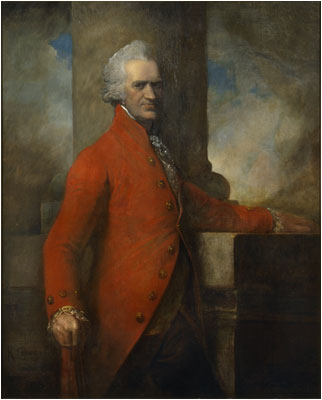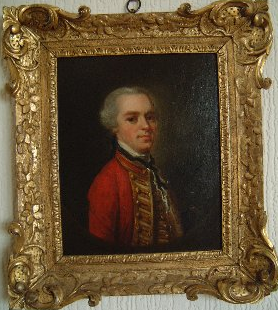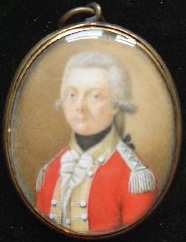|

James Seton, Representative of Barnes, Vice Admiral of the Royal Navy
and Governor of the Island of St. Vincent and the Grenadines
James Seton was the famed Governor of the Island of St. Vincent
and the Grenadines in the West
Indies (or Caribbean), and who had a brilliant military career.
He is most noted for his Governorship and defense of the island
of St. Vincent and those of the Grenadines in the Caribbean,
during the French seige and Caribs revolt after the treaty of
Versailles.
His father, Sir George Seton of
Barnes, assumed the title of Earl of Dunfermline after the death
of James Seton, 4th Earl in France in 1694, was famed
during the '15 Rebellion for having "Proclaimed" the pretender,
King James upon his arrival at Kelso. James' great-great-grandfather was
Sir George
Seton 3rd Baron of Barnes, Kt., was a Justice of the Peace in Haddingtonshire
in 1663, and who was succeeded by his grandson, George, 5th of
Barnes and father of Governor Seton.
In 1773, in recognition of his right as heir-male, James
Seton presented a petition to King
George III to be allowed the title, rank, and privileges of the
Earldom of Dunfermline. The claim was accepted, and the Arms
granted, however, it was not further acted upon due to the want of funds. In the words of Archbishop
Robert Seton of Parbroath, where “it took two English fortunes to
prosecute a peerage case before the House of Lords.”
In the
records of the National Archives in the UK, there includes in
the Coventry Family Papers:
 A
bundle of
genealogical notes and copy documents about the Seton family of
Barnes, which includes a petition by then Lt. Col. James Seton
requesting that the title of Earl of Dunfermline be conferred
upon him, 1773; and notes about the pedigree and descent of the
family from c. 1600. The Seton family papers listed here found
their way into this collection because of the connection by
marriage of the two families in 1842. A
bundle of
genealogical notes and copy documents about the Seton family of
Barnes, which includes a petition by then Lt. Col. James Seton
requesting that the title of Earl of Dunfermline be conferred
upon him, 1773; and notes about the pedigree and descent of the
family from c. 1600. The Seton family papers listed here found
their way into this collection because of the connection by
marriage of the two families in 1842.
In
a letter addressed to Governor James Seton from a number of
residents of the Island dated 7 May 1798, they thank Seton for
his actions on 8 May 1795, especially his reaction to the enemy
capture of Dorsetshire Hill. They also commend Seton on the
corps of 'Rangers' he established to deal with the insurrection
of May 1795 which defended the island until reinforcements
arrived from England.
Copy of minutes of a
meeting of His Majesty's Privy Council of St. Vincent, 5 Mar
1795, attended by James Seton Esq, Governor in Chief of the
Island, include a copy of a letter dated 4 Mar with news of an
imminent attack on the Island of Granada and asking for supplies
of gunpowder, and the response of the meeting to this. They
order an alarm to be sounded and troops dispatched to all parts
of the Island. Minutes also include a copy declaration by the
Council ordering French inhabitants of the Grenadine Islands to
'remain at home during the continuence of the present alarm.
Their conduct and behaviour will be watchfully observed, and in
case of any appearance of disaffection on the part of any
individual amongst them, they will be subjected to the utmost
rigour of Martial Law'.
Also included in the
Coventry Papers: Letter to Ensign James Seton of the 80th
Regiment at Portsmouth from his mother Susan Seton at Moor Park,
7 Apr 1791, asks James to write with his news. Expects his
departure to America at any moment to join Colonel Campbell.
Gives James guidelines as to how he should behave; to be
'punctual', 'polite and civil to all', 'where you meet with
kindness return it with gratitude', to take the advice of
Colonel Dundass and to be 'a slave' to Sir William Erskine. She
also wants him to take care of the cold and to mind the heat in
America
The Vice Admiral had by his wife, Susan Moray, a great beauty in her day and daughter of
James Moray of Abercairney, in the County of Perth, and of Lady
Christian Montgomerie, daughter of the ninth Earl of Eglinton; with other children, a son and
heir James Seton II, who was a Captain in St. Vincent and
later a Lieutenant-Colonel in the Army. The Governor of St. Vincent
later resided at his
Estate of Brookheath House,
Hants, and died in London at an advanced age,
very much respected.
James Seton II was the heir of the Governor and was bred to the
military, and likewise had a brilliant career. He became
Brigade Major, and then later a Lieutenant-Colonel in the
British Army, and married Margaret Findlater, only daughter of the Rev. John Findlater, and had among
other children: his only son and heir, Captain James Alexander
Seton who was killed in a duel leaving an only daughter; two daughters Francis and Eglinton; and Catherine, born 23rd May, 1818
who's line became the Seton-Coventry's. Colonel James
Seton died at Brookheath,
Hants, in 1831. His
Will and codicils of
BrookHeath, Hants near Fordingbridge, was proved 20 July 1831 by
his wife Margaret.
Catherine Seton
married John Coventry, Esq. of Burgate House, Hants, formerly
Rector of Tywardteath and great-grandson of the Earl of Coventry.
One of their sons, Bernard Seton Coventry, born in 1887, founded
the Seton-Coventry line and who's grandson
John James Seton
Coventry
is the last male of the Vice Admiral's line.
Sir George Seton of Barnes,
the titular of Earl of Dunfermline
had
seven children, and his daughter
Anne Seton married Jon Don and were the parents of General
Sir George Don, the noted longest serving Governor of
Gilbraltar (pictured on the right), nephew of the Governor,
Vice Admiral James Seton.
| 
